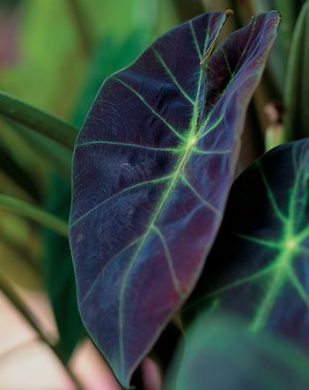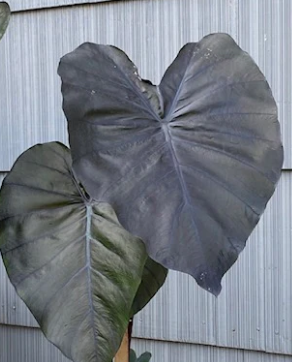Blue Odora Elephant Ear Plant
Alocasia Odora 'Blue' is a fast-growing perennial plant reaching 3–6 ft tall, suitable for USDA zones 9–11, thriving in well-drained loamy soil with partial shade and high moisture, and is not edible or medicinal.

Habit
Perennial
Height
1-2 m
Growth
Fast
Soil
Well-drained loamy
Shade
Partial shade
Moisture
High moisture
Edible
No
Medicinal
No
Origin
South East asia
Climatic Condition
Tropical
Temperature (°)
20-35°C
Humidity (%)
60-80%
Potting media
Loam + Organic Matter
Fertilizers
Balanced NPK (10:10:10)
Watering
Regular watering
Plant Weight
2-5 kg
Flowering Time
Summer
Soil Ph level
5.5-7.0
Water Ph level
6.0-6.5
Soil EC
1.2 dS/m
Yield Per Plant
Moderate yield
NPK ratio
10:10:10
life Span
3-5 years
Health Benefits
Ornamental, edible tubers
Suggested Grow Media or Potting Mix ?
50% peat moss, 30% compost, 20% sand
Suggested Fertigation/Fertilizers
Fertilize monthly with nitrogen-rich fertilizer.
Common Diseases and Remedies
Leaf Spot, Root Rot, Aphids
Yellowing leaves, brown spots, sticky residue
HEALTH BENEFITS
1. Anti-inflammatory: Blue Odora Elephant Ear contains compounds that have anti-inflammatory properties, which may help reduce swelling and pain.
2. Antimicrobial: The plant has been shown to exhibit antimicrobial activity, which can help prevent the growth of bacteria, fungi, and other microorganisms.
3. Antioxidant: Blue Odora Elephant Ear contains antioxidants that can help protect cells from damage caused by free radicals.
Traditional Medicine
1. Wound healing: In traditional medicine, the plant has been used to treat wounds, cuts, and burns due to its antimicrobial and anti-inflammatory properties.
2. Skin conditions: Blue Odora Elephant Ear has been used to treat skin conditions such as eczema, acne, and dermatitis.
3. Respiratory issues: The plant has been used to treat respiratory problems such as bronchitis, asthma, and coughs.

